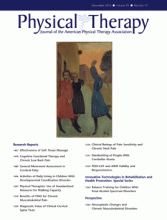Abstract
Background The use of standardized assessment tools is an element of evidence-informed rehabilitation, but physical therapists report administering these tools inconsistently poststroke. An in-depth understanding of physical therapists' approaches to walking assessment is needed to develop strategies to advance assessment practice.
Objectives The objective of this study was to explore the methods physical therapists use to evaluate walking poststroke, reasons for selecting these methods, and the use of assessment results in clinical practice.
Design A qualitative descriptive study involving semistructured telephone interviews was conducted.
Methods Registered physical therapists assessing a minimum of 10 people with stroke per year in Ontario, Canada, were purposively recruited from acute care, rehabilitation, and outpatient settings. Interviews were audiotaped and transcribed verbatim. Transcripts were coded line by line by the interviewer. Credibility was optimized through triangulation of analysts, audit trail, and collection of field notes.
Results Study participants worked in acute care (n=8), rehabilitation (n=11), or outpatient (n=9) settings and reported using movement observation and standardized assessment tools to evaluate walking. When selecting methods to evaluate walking, physical therapists described being influenced by a hierarchy of factors. Factors included characteristics of the assessment tool, the therapist, the workplace, and patients, as well as influential individuals or organizations. Familiarity exerted the primary influence on adoption of a tool into a therapist's assessment repertoire, whereas patient factors commonly determined daily use. Participants reported using the results from walking assessments to communicate progress to the patient and health care professionals.
Conclusions Multilevel factors influence physical therapists' adoption and daily administration of standardized tools to assess walking. Findings will inform knowledge translation efforts aimed at increasing the standardized assessment of walking poststroke.
Footnotes
All authors provided concept/idea/research design, writing, and data analysis. Ms Pattison and Dr Salbach provided data collection. Ms Pattison provided project management. Dr Salbach provided fund procurement, facilities/equipment, and institutional liaisons. Dr Brooks, Dr Cameron, and Dr Salbach provided consultation (including review of manuscript before submission).
The Research Ethics Board at the University of Toronto approved the study protocol.
This project was funded by a Connaught New Researcher Award, Faculty of Medicine, University of Toronto. Dr Brooks holds a Canada Research Chair. Dr Cameron and Dr Salbach hold Ontario Ministry of Research and Innovation Early Researcher and Canadian Institutes of Health Research New Investigator Awards.
- Received June 18, 2014.
- Accepted April 22, 2015.












